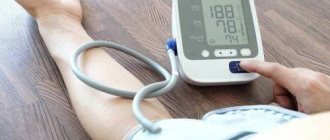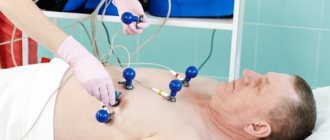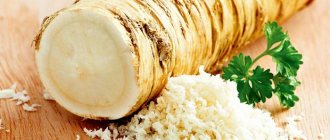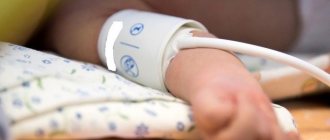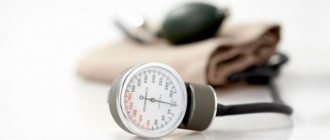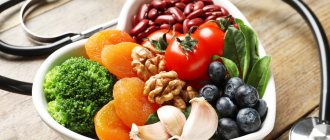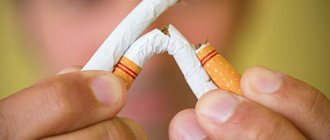Home>Articles>Features of the effects of alcohol on blood pressure
quick menu (hide)
- The effect of alcohol on blood pressure
- Alcoholic drinks for hypertension
- Alcohol for hypotension
- Actions in case of high blood pressure
- High blood pressure due to hangover and binge drinking
- The effect of different types of alcohol on blood pressure
Men and women suffering from hypertension or hypotension are often interested in the question: how does alcohol affect blood pressure and can it be consumed if these diseases are present? Experts believe that alcoholic drinks can both lower and increase blood pressure levels.
The effect of alcohol in hypertension or hypotension depends on many factors - what kind of drinks were consumed, how often and in what quantity. Regular drinking of alcohol in large quantities necessarily leads to an increase in blood pressure, and after a while – to a decrease. Therefore, hypertensive and hypotensive patients should be extremely careful with strong drinks.
The effect of alcohol on blood pressure
When answering the question of whether alcohol affects blood pressure, it should be remembered that ethyl alcohol significantly increases the likelihood of developing hypertension. This indicator directly depends on the amount drunk. Frequent consumption of alcohol can have serious consequences for the cardiovascular system and the entire body. Therefore, it is very important not to get carried away with strong drinks and drink them in moderation.
Regardless of blood pressure, alcohol is absolutely contraindicated in the following cases:
- period of pregnancy and breastfeeding;
- children and adolescents up to 18 years of age;
- renal and liver pathologies;
- mental disorders;
- brain diseases.
Does alcohol raise or lower blood pressure? It all depends on the amount you drink. Depending on the individual characteristics of the body, each person has his own alcohol limit, which is safe and harmless to the health of the heart and blood vessels. Most often it is 500 ml of beer, 150-200 ml of wine, 50-80 ml of vodka, cognac or other strong drink.
The main danger of these indicators is that with regular use, a person develops a strong attachment to strong drinks, as well as a desire to constantly increase the dosage of the drink. In many cases, this becomes the cause of alcoholism.
Useful tips
To monitor your health, it is recommended to regularly measure your pulse and blood pressure. Following these tips will help you forget about the symptoms of hypertension.
- Exercise stress. Daily walks in the fresh air, morning exercises, warm-up during the working day - these activities help maintain vitality, as well as maintain healthy blood circulation.
- Diet. Diet adherence is mandatory. The most acceptable diet looks like this: 5-6 times a day in small portions. A sufficient amount of liquid is also important. For full functioning of life, doctors prescribe a norm of 1-1.5 liters of clean water for hypertensive patients. Water should not be replaced with other liquids, as it also thins the blood and is rich in essential microelements.
- Vitamin C. It is necessary to exclude a deficiency of vitamin C in the body of a hypertensive patient, since doctors have established a direct correlation between the lack of vitamin and the occurrence of an attack.
- Weight. Excess weight is unacceptable, so it must be eliminated through regular exercise and diet. Strict diets and fasting, just like excessive exercise, are contraindicated as extra work for blood vessels.
- Smoking and alcohol. Complete abandonment of bad habits can guarantee a minimal risk of developing hypertension.
Alcohol for hypertension
Experts believe that alcohol can be consumed if you have hypertension - but only within limits that do not cause a hangover . In such cases, it has virtually no effect on blood pressure levels. But as a hangover develops, the blood pressure level quickly rises , and the hypertensive patient’s well-being worsens even more.
In some cases, the cause of hypertension is excess body weight . As you know, alcoholic drinks are very high in calories and can provoke excess weight - as a result, the disease only gets worse.
The main side effects of alcohol in hypertension:
- Reduced effectiveness of medications taken.
- Increase in body weight, development of obesity.
- Increased blood sugar and cholesterol levels.
- Formation of blood clots, thickening of blood.
- Disturbances in the functioning of the central nervous and cardiovascular systems.
- Swelling of the face and body.
- Deterioration of elasticity and tone of blood vessels.
- Increased intracranial pressure.
If a hypertensive patient is taking any medications for high blood pressure, ethyl alcohol can neutralize their therapeutic effect and minimize the effectiveness of treatment.
In addition, alcohol increases the manifestations of side effects of medications for hypertension, therefore, when answering the question of whether alcohol can be used for hypertension, it is important to remember that such compatibility carries a mortal danger to the human body.
At least 12 hours must pass between taking the medication and drinking alcohol.
Consequences of an attack
The onset of a hypertensive crisis may be the moment when the patient first learns about his illness. The main thing at this moment is not to panic, take a comfortable position, breathe calmly and deeply. If the condition does not return to normal, you should call an ambulance.
You should not hesitate to call a team, since there are two types of development of a hypertensive crisis: complicated and uncomplicated. When complicated, damage to the eyes, heart, liver, and kidneys is observed. Hospitalization is also required.
An attack can be recognized by the following signs:
- Memory loss;
- Confusion;
- Redness of the skin;
- Nausea and vomiting;
- Loss of sensation in the limbs;
- Cardiopalmus;
- Chest pain.
Symptoms of an attack vary individually in each patient, so if you suspect a hypertensive crisis, you should immediately call a doctor.
The consequences of an attack can be:
- Brain swelling;
- Pulmonary edema;
- Acute circulatory disorder in the brain;
- Heart attack;
- Death.
After going to the hospital, the doctor talks about the causes of the disease, risk factors, healthy foods, and also tells whether it is possible to drink alcohol if you have hypertension.
What to do if your blood pressure rises?
If a person drank a strong drink and then felt unwell, it is necessary to measure the blood pressure level. An increased rate, not exceeding 20-25% of the norm, can be eliminated by taking magnesium sulfate - an affordable and safe drug, which is also known as magnesia.
High blood pressure exceeding 25% of normal is an alarming sign that requires immediate medical attention. You need to call an ambulance immediately.
How does the body react to increasing doses?
If after taking a small dose of alcohol vascular tone improves, then increasing the portion, on the contrary, worsens vascular tone. The vessels spasm and contract, and it becomes increasingly difficult for blood to circulate throughout the body. And this increases the pressure. And with every glass you drink, your blood pressure levels increase. In the future, a hypertensive crisis or a heart attack while intoxicated may occur. It is for this reason, according to doctors, that alcohol abuse is harmful to everyone, and to hypertensive patients in particular.
High blood pressure due to hangover and binge drinking
Hangover syndrome is characterized by various autonomic disorders - severe headaches and dizziness, tremors of the limbs, increased heart rate, difficulty breathing, decreased or increased blood pressure. In such cases, hypertensive patients are recommended to take magnesium sulfate, as well as drugs for general detoxification after a feast.
In case of binge drinking, the blood pressure level increases and lasts for a long time. To eliminate the problem, you can use the following medications :
- Capozide.
- Adelfan.
- Kapoten.
- Furosemide.
- Diacarb.
- Triampur.
- Glycerol.
Diuretics, which include Furosemide and Diacarb, must be taken with great caution. Together with excess fluid, Furosemide removes useful microelements from the body - therefore, the pharmacological drug should not be taken for hypotension and arrhythmia.
Diacarb is considered a diuretic drug with a milder and more gentle effect. In most cases, it is well tolerated by the human body, does not affect metabolic processes and electrolyte balance, and has a minimal number of contraindications and side effects. After binge drinking, Diacarb is recommended to take a tablet every morning for 5-7 days.
Causes
Hypertension is a disease that manifests itself not only in older people, whose blood vessels are worn out and clogged. An unhealthy lifestyle and unbalanced diet also negatively affect health and can cause serious problems.
Causes of hypertension:
- Genetic predisposition. It is caused by a similar body structure, so if one or both parents suffer from hypertension, most likely the child may also have this disease.
- Excessive salt intake. The critical level is considered to be 5 grams of salt per day, but it is almost impossible to calculate this due to the fact that some foods contain salt. Hypertensive patients are strongly advised not to add additional salt to food, since salt promotes the circulation of excess fluid in the body, thereby causing disturbances in the digestive process and affecting vascular health.
- Smoking and alcohol. Nicotine and alcohol cause vasospasm, so smokers ultimately suffer from insufficient vascular lumen, as the vessels narrow during smoking. If you have hypertension, alcohol should be limited by drinking an occasional glass of dry red wine.
- Caffeine consumption. Caffeine, like tobacco products, provokes vascular spasms, affects blood circulation and increases heart rate. Caffeine is found in strong tea, coffee, and cocoa.
- Age. Over time, blood vessels undergo changes, so middle-aged and elderly people are more likely to suffer from hypertension.
- Stress. Instability to stress is an important factor in the development of hypertension. Due to constant tension and increased adrenaline, blood flow is disrupted. Stressful situations include personal worries regarding old problems, the inability to meet other people's requirements, perfectionism and workaholism.
- High cholesterol. The existence of plaques, increased blood viscosity and the presence of blood clots inevitably affects the health of blood vessels. You should avoid fatty meats, preserves, and sausages. Blood thinning products are used to lower cholesterol.
The effect of different types of alcohol on blood pressure
There is an opinion that only strong alcoholic drinks can affect blood pressure. This is wrong. Beer and other low-alcohol drinks have a small percentage of ethyl alcohol, so a person, without noticing it, drinks a large amount of the drink. This puts increased stress on the kidneys and increases the risk of a hypertensive attack .
There are a number of alcoholic drinks that cause a decrease in blood pressure:
- cognac;
- whiskey;
- balm;
- White wine.
Most often, these alcoholic drinks lower blood pressure for a short period of time - no more than 2-3 hours, after which it can rise even more.
Also, as a result of the research, strong drinks were identified that can increase blood pressure. These include:
- vodka;
- red wine;
- champagne;
- beer.
But the effect of ethyl alcohol depends on the individual characteristics of the body, so in no case should you use alcohol as a means to lower or increase blood pressure. Adverse reactions of this combination can be the most severe. Doctors recommend drinking alcohol no more than 1-2 times a week - it is safe for health.
Benefits of a sober lifestyle
It is impossible to describe all the advantages of a sober lifestyle . When the mind is not intoxicated by alcohol, clarity of thinking, efficiency, ability to make the right decisions, and analyze the situation are preserved. The main advantages of a healthy lifestyle:
- No more hangovers. Every morning begins with plans and the desire to live, and not with hellish headaches and the urge to hangover.
- Nice appearance. It is much more pleasant to observe the reflection of a healthy person in the mirror than to meet the blurred gaze of reddened eyes.
- Vigor and efficiency. The ability to think logically, draw conclusions, solve problems, and integrate into the rhythm of life helps maintain self-esteem and maintain normal brain function.
- Excellent memory. Now the chances of losing your wallet are much less. At least the person remembers where he could have left it.
- Adequate condition. When sober, a person controls his emotions and calculates his strength. Drunk people lack a sense of fear, which leads to domestic tragedies, road accidents and other consequences.
The most important advantage is establishing relationships with loved ones, friends, and colleagues. The person again becomes a full-fledged member of society, loved by his family and respected by his colleagues.
Ethanol methodically destroys the body, destroys family and friendly ties, moral principles, the ability to think and analyze. Giving up it will help you regain your health and position in society, feel the joy of critical thinking and look at the world soberly.
